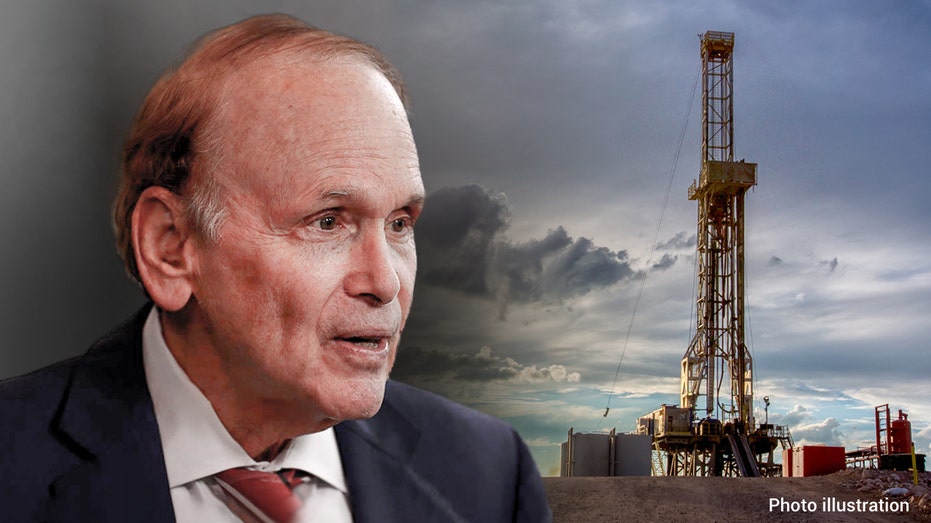Energy expert urges US independence, says security must be ‘back on the agenda’
Energy independence is ‘taken for granted’ in America, S&P Global Vice Chairman Daniel Yergin said in Davos
Energy security 'is back on the agenda,' 'cannot be assumed away': Daniel Yergin
S&P Global Vice Chairman Daniel Yergin says America has taken for granted 'the big revolution' in energy independence.
As the energy conversation at the World Economic Forum centers around climate change, S&P Global Vice Chairman Daniel Yergin argued U.S. energy independence "cannot be assumed away" on "Mornings with Maria" Friday.
Yergin spoke with host Maria Bartiromo in Davos, Switzerland, where a global green energy transition has been a hotly debated topic among world and business leaders. But the energy expert warned the renewable push could cause under-investment in critical oil and gas companies.
"I think there's obviously a problem of under-investment on a global basis when you look at the economic growth that's ahead," Yergin said. "Right now, the oil market is well supplied, probably oversupplied, and that reflects weakening economic activity around the world. And the fact that China has been out of the game - but when China comes back, I think we're going to see a tighter market."
On Wednesday, the national average cost for a gallon of gas rose to $3.32, four cents more than last week and 17 cents more than a month ago. But demand for gas has eroded, evidenced by the increase in gasoline supply to 226.8 million barrels of crude oil (bbl) from 222.7 million bbl.
U.N. SECRETARY-GENERAL SAYS ‘BIG OIL’ PEDDLES ‘BIG LIE,’ SHOULD BE ‘HELD TO ACCOUNT’ LIKE TOBACCO
The lackluster demand for gas and the increase in supply are limiting pump price increases, AAA said.

S&P Global Vice Chairman Daniel Yergin says current oil prices indicate "weakening economic activity around the world," on "Mornings with Maria" Friday, January 20, 2023. (Getty Images)
The slowing demand and commodity prices are a sign that we’re now seeing impacts of an economic slowdown, Yergin claimed.
"We've already seen the slowdown, it's already here," Yergin said. "It's the general consensus now that it's in the first part of the year. But that's one reason gasoline prices are where they are, not where they were three or four months ago when there was a lot of agitation about them. So I think that commodity prices are already reflecting the slowdown."
Yergin further expressed that energy security is national security, and cautioned the U.S. isn’t tapping into its full potential.
"The big revolution, which is now just taken for granted in the United States, is we are essentially energy independent. Eight presidents said we have to be energy independent, it seemed impossible. We've done it and achieved it now," Yergin pointed out.
"But I think long term, where is the growth going to be?" he continued. "It's going to be in 80% of the people who live in emerging markets. And so I think that question of investment... is going to continue to be a question that will go through cycles."
Big oil producers investing in the future despite global turmoil: Michael McKelvy
McDermott International CEO Michael McKelvy discusses the transition from fossil fuels to clean energy and the investment in alternate power sources on 'Mornings with Maria.'
For investors to see a potential return on oil investments, it will take environmental social and corporate governance (ESG) reform and putting energy security back on lawmakers’ agenda.
Yergin said of what investors should prioritize: "I think realizing that this kind of ESG really needs to be redefined," and "energy security is back on the agenda, it cannot be assumed away."
The S&P Global vice chairman predicted that most oil and gas growth opportunities will flow from developing countries, where demand for natural gas remains high.
"What I really heard from the emerging markets and developing countries, they say, ‘We need that investment. We need that natural gas pipeline so people are not cooking with wood, so women are not spending 3 hours a day gathering wood for indoor cooking,’" Yergin said. "And so I find this rising tone from the developing countries saying we have to be part of this discussion, too, and we need that finance."
Brian Moynihan on economy, energy independence: 'Capitalism will solve these problems'
Bank of America Chairman and CEO Brian Moynihan discusses industry layoffs, Federal Reserve trajectory and investing in innovation from the World Economic Forum.
"There's a climate priority, but we have other priorities called economic growth, reducing poverty and better health," he added.
The energy expert warned "another problem" in natural, critical resources is coming: shortages in minerals like copper, lithium and nickel.
"We're going to have another problem, which we'll be talking about in the years ahead, which is minerals access to things like copper, lithium," Yergin said. "You've just seen how copper prices have started to go up again on the opening of China."
GET FOX BUSINESS ON THE GO BY CLICKING HERE
UN secretary-general says 'Big Oil' peddles 'big lie,' should be 'held to account' like tobacco
UN Secretary-General António Guterres told the World Economic Forum Wednesday that "Big Oil" companies should be targeted the way tobacco companies were.
With climate backlash and complicated bureaucracy preventing the creation of new mines, Yergin predicted an "upward inflationary" trend for earth minerals.
"It's been hard to invest in mines, I think opening a new mine, including permitting, could take 16 to 25 years. So it takes much longer than oil and gas," S&P Global’s vice chairman said. "I think that you're going to have, with all this investment and requirements, an upward inflationary. I mean, if I look again at our [project management information systems], we see a moderation in inflation for now, but I think you're building in a different kind of inflation into the infrastructure."
FOX Business’ Nora Colomer contributed to this report.
























